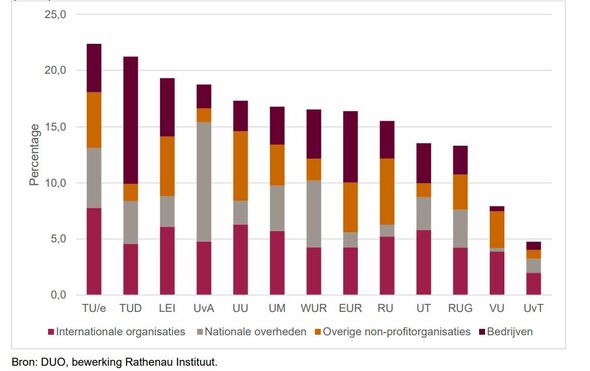TU/e’s third flow of funds won’t be fully transparent
TU/e will only make a small part of its third flow of funds available to the public by way of clusters due to contracts with companies that prohibit full transparency. Cursor has been trying to gain insight into these records since January 2022. Protest group University Rebellion too has for a long time requested transparency and met with the Executive Board for the first time on April 12 to be informed about the information that is to be made public: categories of investments.
Universities receive their funding from different flows of funds. The first flow of funds concerns the money that comes directly from the Ministry of Education, Culture and Science. The second flow of funds comes from independent, public organizations, such as NWO. The third flow of funds is more diverse: the money comes from several private institutions and companies. The identities of these organizations, however, as well as the exact sums involved, remain unclear. With 22 percent, TU/e has the largest third flow of funds in the Netherlands. Cursor isn’t alone in trying to identify, for the benefit of the TU/e community, the organizations that (co)finance the university’s educational and research activities. The third flow of funds also features on the agendas of political parties and protest groups. The motion Westerveld led to independent investigations into the third flow of funds and the ways in which scientific research is influenced. This investigation was carried out by the Rathenau institute in 2020. Interestingly enough, this investigation quickly showed that there is a lack of transparency: the investigators were basically unable to draw any conclusions about undesired influence because they didn’t have sufficient data at their disposal.
Influence from China
When the news broke out in January of 2022 that China provided subsidy for a human right research carried out at the VU in Amsterdam, Cursor decided that this was yet another reason to request insight into TU/e’s third flow of funds. What’s the situation here in Eindhoven? Do (unfree) countries or companies exert an influence on our university’s research and/or educational activities? Cursor requested records about the third flow of funds dating back to early 2021, but the university decided not to comply. It will only submit limited information starting in the year 2022. University spokesperson Ivo Jongsma gives the following explanation: “We intend to submit information about our industry funding, starting in the year 2022, via our annual report. This is a major annual operation in terms of coordination with the companies in question, which is something we like to do in order to be able to offer transparency. It is not our intention to retroactively collect records and to provide information about previous years. We expect, incidentally, that the picture that emerges from more recent previous years won’t be all that different from 2022.”
University Rebellion
During its many protests, University Rebellion regularly asked for transparency concerning the third flow of funds. Following the most recent occupation at the end of last year, TU/e agreed to provide the protest group with more transparency and insight into the annual report’s new setup prior to its publication. However, separate sums of investments per individual organization will not be made public. University Rebellion was given that insight on April 12 and described the meeting as “a good step.” Furthermore, the protest group is “curious about the full report, which will be published in late spring. Despite the fact that this is a major step for TU/e in itself when it comes to transparency, we believe that there is still much that needs to be done, which is why will to continue to demand full transparency.”
The setup as described by University Rebellion – after having seen the document during its meeting with the Executive Board – is subdivided into three categories: small investments (<25k), medium-sized investments (25k-100k) and large investments (>100k). The protest group writes: ‘The total sum per category will not be made public. Shell belongs to the major investments category, RWE to the small category. BP and Exxon Mobil are not mentioned in this overview, but it is important to know that the money that goes to study associations or the Wervingsdagen isn’t included in this overview because these are separate entities.”
Confidentiality clauses
The information won’t be made public per individual company. Jongsma gives the following explanation: “The confidentially clauses in the individual agreements determine that certain information can only be made public when all parties are in agreement. This involves relevant issues such as the exact sums, subject of study, intended project results, et cetera. All of this is competition-sensitive information for companies. That’s a positive thing, because it means that the project concerned is truly relevant for a company, and, in the long run, for society.”
Jongsma welcomes the university’s new step: “In order to provide more transparency about funding from the private sector, a list was compiled for the year 2022 that will be added to the upcoming annual report. That list includes every company – over a hundred – classified by the extent of their cooperation with TU/e. That provides a good overview of the companies with which TU/e cooperates, and of the extent of that cooperation. We are the first university in the Netherlands to take a serious step towards providing transparency regarding funding from industry. This is important to us, since we are a university known for its exceptionally close collaboration with industry.”
Available in June
Jongsma says that the definitive list will become available in June. “We are carefully going through an internal process that leads to, among other bodies, the Advisory Board and the University Council. These processes of coordination are currently taking place. The list will be sent to the university council in June, after which it will be publicly available. In view of that process of careful coordination, we won’t be able to make the list publicly available at an earlier date.”



Discussion